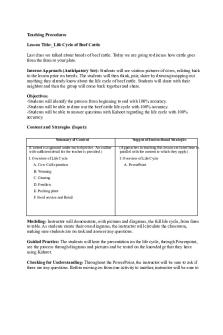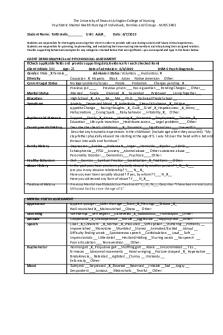KCupp Mini Care Plan 4 - mini care plan PDF

| Title | KCupp Mini Care Plan 4 - mini care plan |
|---|---|
| Course | Acute & Chronic Nursing |
| Institution | Southern Nazarene University |
| Pages | 2 |
| File Size | 80 KB |
| File Type | |
| Total Downloads | 48 |
| Total Views | 134 |
Summary
mini care plan...
Description
Kaytlin Cupp – Mini Care Plan 4
Demographic Patient initial: Mr. C.S. Date of care: 10/19/20 Unit: Rehab Age: 89
Date of admission: 10/15/2020 Day of stay: 5 Gender: Male Race / ethnicity: Caucasian
Admitting diagnosis: Left subdural hematoma Co-morbidities: Dementia, hypothyroidism, CVA, Parkinson’s disease, coronary artery disease with pacemaker placement, atrial fibrillation, BPH Allergies: Sulfa and Macrobid Functional/residual history: Resides in a memory unit and requires assistance with ADLs and cognitive tasks – minimal assist bed transfer and moderate assist bed mobility, minimal assist chair transfer, ambulating four steps with a rolling walker moderate assist, moderate assist with ADLs.
Nursing Diagnosis #1: Ineffective cerebral tissue perfusion related to subdural hematoma as evidence by head CT from 10/15/2020 of left-sided subdural hematoma with mild mass effect on the left cerebral hemisphere. Assessment data to support diagnosis: confusion that is more significant than noted baseline for patient, lethargy, headache, decreased concentration, and mild mental status changes Short-term Goal: Patient will show no further worsening of deficits by end of shift Long-term Goal: Patient will exhibit improvements in mental status to return to his individualistic baselines by discharge Intervention #1: Assess VS and neuro exams q2h or as needed – note changes in pupil size and reactivity, or any changes in respiration rate, depth, or pattern Intervention #2: Continue to administer Keppra 500 PO b.i.d. as ordered until next seen by neuropsychology specialist Evaluation of Short-term Goal: Goal has been met as evidence by adequate cerebral perfusion maintained by end of shift at 1700 Evaluation of Long-term Goal: Goal currently unmet Evaluation of Intervention #1: Pt shows PERRLA with no changes noted in neurological or respiration status that would indicate brain stem compression Evaluation of Intervention #2: Patient tolerating medications and is scheduled to see neuropsychology specialist tomorrow, 10/20/2020
(Version:DMc1Jan2019)
1
Nursing Diagnosis #2: Risk for injury related to general status and orientation of patient as evidence by inability to recall how obtained a subdural hematoma Assessment data to support diagnosis: A&O varies times 3 to 4, requires assistance with ADLs and ambulation; difficulty finding words during a conversation; poor short-term memory; forgetting details of personal history Short-term Goal: Patient will maintain full control of bowel and bladder throughout shift Long-term Goal: The use of restraints will be avoided during patient’s stay. Intervention #1: Routinely assess client for dehydration and potential urinary tract infection that could worsen level of confusion and place patient even more at risk of injury Intervention #2: Contact significant other or other family members to be with patient to prevent him from falling. Evaluation of Short-term Goal: Patient was able to maintain control of bowel and bladder throughout shift, pressing call light to alert staff when he needed to void Evaluation of Long-term Goal: Goal partially unmet – thus far, patient has been easily maintained without the use of restraints, which are invasive and could potentially lead to injuries. Evaluation of Intervention #1: No changes related to infection or dehydration noted Evaluation of Intervention #2: Patient seemed to have been confused when he stated that his wife was still alive – currently attempting to get ahold of any other living family members.
(Version:DMc1Jan2019)
2...
Similar Free PDFs

UTI Care Plan - Care Plan
- 7 Pages

Care plan 3 - Care Plan
- 3 Pages

Care Plan 1 - Care plan
- 7 Pages

Care Plan 2 - Care plan
- 21 Pages

N101L Care Plan - Nursing Care Plan
- 11 Pages

Care Plan - care plan for clinical
- 16 Pages

Care plan MI - care plan mi
- 5 Pages

Claudia Brady Mini Lesson Plan
- 2 Pages
Popular Institutions
- Tinajero National High School - Annex
- Politeknik Caltex Riau
- Yokohama City University
- SGT University
- University of Al-Qadisiyah
- Divine Word College of Vigan
- Techniek College Rotterdam
- Universidade de Santiago
- Universiti Teknologi MARA Cawangan Johor Kampus Pasir Gudang
- Poltekkes Kemenkes Yogyakarta
- Baguio City National High School
- Colegio san marcos
- preparatoria uno
- Centro de Bachillerato Tecnológico Industrial y de Servicios No. 107
- Dalian Maritime University
- Quang Trung Secondary School
- Colegio Tecnológico en Informática
- Corporación Regional de Educación Superior
- Grupo CEDVA
- Dar Al Uloom University
- Centro de Estudios Preuniversitarios de la Universidad Nacional de Ingeniería
- 上智大学
- Aakash International School, Nuna Majara
- San Felipe Neri Catholic School
- Kang Chiao International School - New Taipei City
- Misamis Occidental National High School
- Institución Educativa Escuela Normal Juan Ladrilleros
- Kolehiyo ng Pantukan
- Batanes State College
- Instituto Continental
- Sekolah Menengah Kejuruan Kesehatan Kaltara (Tarakan)
- Colegio de La Inmaculada Concepcion - Cebu







